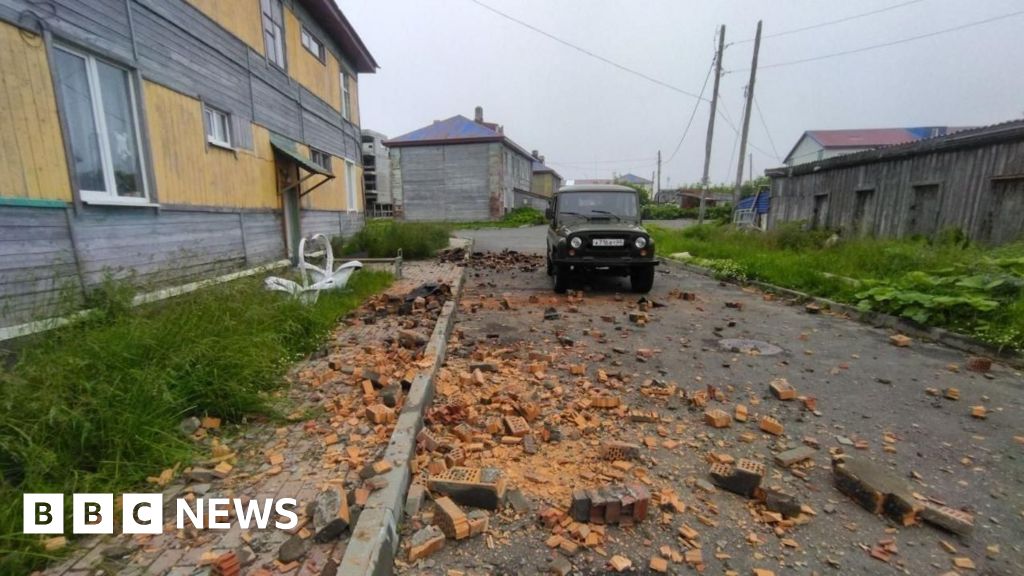生成中...【新闻麻辣烫】
俄罗斯8.8级大地震上演"雷声大雨点小"!这场堪察加半岛的超级地震虽然跻身历史前十强,引发的海啸却意外"温柔"——最高才4米浪高,比起2004年印度洋海啸的几十米巨浪简直是小巫见大巫。最搞笑的是,地震学家们挠破头也想不通:为啥这次板块"摔跤比赛"没引发灾难?原来海底地形和震源深度在偷偷"放水",而太平洋沿岸的预警系统这次终于没掉链子。不知道那些穿着睡衣逃到高地的190万日本居民,看到最终只有小浪花时是该庆幸还是该吐槽?(背景音请自动播放《惊涛骇浪》轻音乐版)
---
**Why Russian mega earthquake didn't trigger catastrophic tsunami**
为何俄罗斯超级地震未引发灾难性海啸
**An 8.8-magnitude earthquake off Russia's Kamchatka Peninsula - one of the strongest ever recorded - triggered tsunami warnings but caused far less damage than feared.**
俄罗斯堪察加半岛近海发生的8.8级地震(有史以来最强之一)虽引发海啸警报,但造成的破坏远低于预期。
**Millions were evacuated across the Pacific, recalling deadly tsunamis in 2004 and 2011, but waves peaked at just 4m (13ft) in Russia.**
环太平洋地区数百万人被疏散,让人想起2004年和2011年的致命海啸,但海浪在俄罗斯仅达4米峰值。
---
**The quake occurred where the Pacific plate collides with the Okhotsk microplate at 8cm/year - fast by tectonic standards.**
地震发生在太平洋板块与鄂霍次克微板块以每年8厘米速度碰撞处(按地质标准算快)。
**"When plates get stuck then suddenly release energy, it creates megathrust quakes covering hundreds of kilometers," explained Dr Stephen Hicks, seismologist at UCL.**
"当板块卡住后突然释放能量,就会产生覆盖数百公里的巨型逆冲地震,"伦敦大学学院地震学家斯蒂芬·希克斯博士解释。
---
**Three key factors limited tsunami damage: 1) Earthquake depth (20.7km), 2) Local seafloor topography, 3) Coastal land shapes.**
三个关键因素限制了海啸破坏:1)震源深度(20.7公里) 2)当地海底地形 3)海岸陆地形状。
**"Deeper quakes or different underwater canyons could have created much bigger waves," said Prof Lisa McNeill of Southampton University.**
"更深的震源或不同的海底峡谷可能引发更大海浪,"南安普顿大学教授丽莎·麦克尼尔表示。
---
**Improved early warning systems also helped - unlike the 2004 tsunami that killed 230,000 without alerts.**
改进的早期预警系统也起到作用——不像2004年毫无预警造成23万人死亡的海啸。
**Pacific nations now have tsunami centers issuing real-time evacuation orders.**
太平洋国家现设有海啸中心实时发布疏散指令。
---
**The region remains seismically active, with aftershocks expected for a month.**
该地区仍处地震活跃期,余震可能持续一个月。
**In 1952, a magnitude 9.0 quake struck just 30km away, triggering 12m-high waves.**
1952年,一场9.0级地震在仅30公里外发生,引发12米高巨浪。
---
**While this event avoided catastrophe, scientists stress the Pacific"Ring of Fire" remains highly unpredictable.**
尽管此次事件避开了灾难,科学家强调太平洋"火环带"仍高度不可预测。
**"We can forecast probabilities but never exact timing," cautioned Prof McNeill.**
"我们只能预测概率而非确切时间,"麦克尼尔教授警告道。

